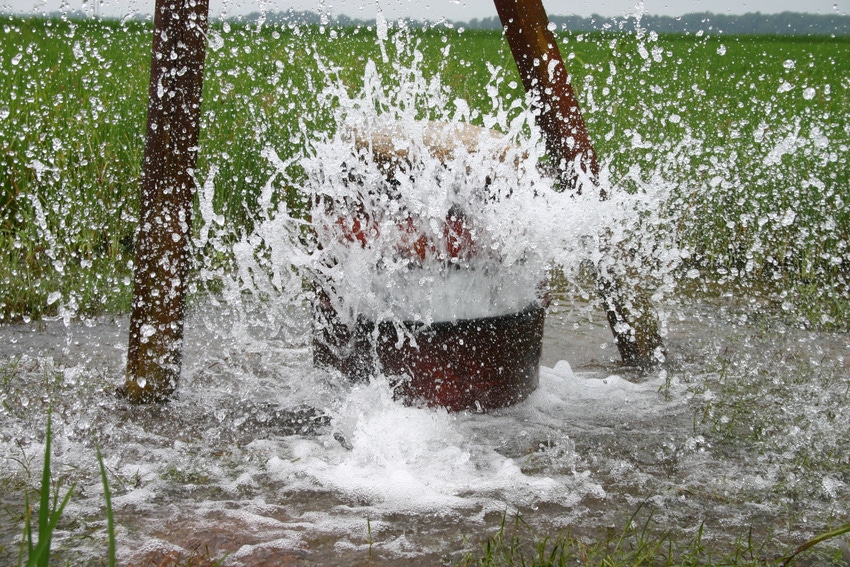
Few know that on the list of states doing the most irrigating, Arkansas is fourth. Even fewer may know that the Arkansas Water Plan is in the process of being updated to address short- and long-term use, health and continued availability of the precious resource.
Those are two big reasons why the University of Arkansas Extension Service has begun a major push to educate the agriculture community on how to best use water.
However, says Poinsett County Extension agent Mike Hamilton, there is a bigger reason for the effort: simple economics. "We’re seeing a 25 percent bump, on average, cost savings when using PHAUCET or the Delta Plastics’ Pipe Planner program to determine hole sizes in your irrigation tubing from start to end. That’s true whether you’re working in a perfectly rectangle field or one that’s oddly shaped.”
The cost savings are proven with both programs.
The Arkansas Water Plan is certainly also in the mix, says Hamilton, who is part of the large group working on the update. “That’s an effort that rather comprehensive and will certainly have an impact on agriculture. I’m on that committee and I can tell you that water is coming to the foreground as an important state priority. Water has always been key to Arkansas’ success but it’s even more so now.
“Our water is so important. Anything we can do to save water and be better stewards of our land and water, the better off we’ll be.”
Groundwater use is a good example of the need to examine whether the state has made progress with its water plan, says Edward Swaim, Water Resources Division Manager with the Arkansas Natural Resources Conservation. “A new groundwater law was passed in 1991. We have, for over 20 years, put together groundwater reports based on measurements taken from over 1,000 wells around the state. That data, with the help of the USGS, has been put into models to see what trends are with groundwater depletion.
“Where we’ve found problems that aren’t going away, our commission has declared critical groundwater areas,” said Swaim in a lengthy Farm Press interview earlier this year. “There has been no regulation in these areas, but we’ve tried to help people reduce their groundwater use through tax credits for land-leveling, reservoir-building and conversion from ground- to surface-water use. From our perspective, we still haven’t gotten a handle on the problem because we still use more from the ground than is recharged from the surface.
“At the same time, the demand for irrigation water has risen. Farmers need the certainty irrigation provides.”
PHAUCET
Towards that end, Hamilton and Extension colleagues have begun a series of workshops to teach PHAUCET to producers and consultants. “We’re training producers on how to use PHAUCET, which was developed by the Missouri NRCS. It’s a technical program and you really need to know how to tweak it and get the information you need to provide a good design, a good irrigation set-up.”
Anyone wanting to attend had best get their foot in the door early. That’s because agents want to keep crowds at training events at a size, “where we can really be one-on-one, hands on, with those learning the program.”
Following the initial early-April meeting at the Lon Mann research station in Marianna -- where attendees included consultants from the Missouri bootheel -- the concept proved out. Further training sessions in Dumas and Jonesboro have also provided “excellent” responses from farmers and consultants.
“In the morning, we train (Extension) agents how to use the program,” says Hamilton. “Then, farmers and consultants come in during the afternoon and the agents are up to speed on how to help them. The hope is once the agents gain confidence in PHAUCET they will do more of this training in counties as the year goes along.
“It wouldn’t work nearly as well if I just stood up and started teaching for an hour. You never know who has good computer skills. It’s much better to have a teacher-to-student ratio that allows the farmers to go at their own rate.”
While rains have caused a stuttering planting season, they have also provided time for the training. “When the forecast is unfavorable for planting it may be favorable for a session. When we can, we’ll quickly schedule a meeting. We’re looking to do more in the future."
Hamilton points to Chris Henry, irrigation specialist based in Stuttgart, as someone whose work producers would be smart to follow. “He’s top-notch and has a lot of irons in the fire. He’s doing a bunch of research on surge valves and other things looking for cost savings and smarter water use.
“There’s a lot of work ahead of us in educating everyone about the need to do this. But we can do it.”
About the Author(s)
You May Also Like




